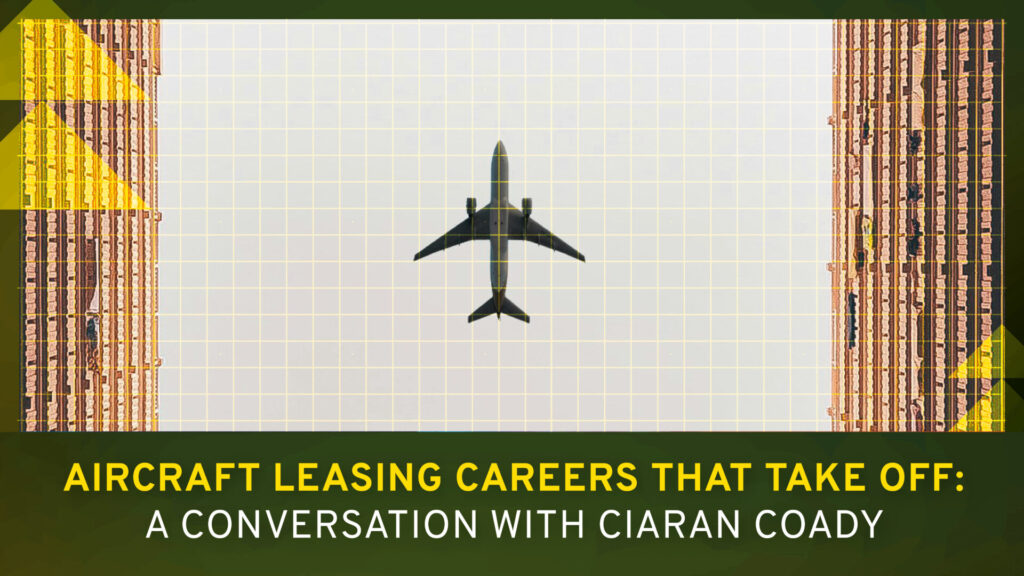What prompted you to join KPMG after you finished university?
I was in the same position as a lot of people are when leaving college, where you’re not entirely sure what the next step you want to take is. There’s always a big recruitment drive on campus from the Big Four companies. I explored a few different opportunities across industries, but I was drawn to KPMG.

I was also keen to get exposure to different sectors and business models early in my career, and KPMG provided that variety. Looking back, it was a great way to learn how different organisations operate and to figure out what areas of finance really interested me.
You gained your first exposure to the aircraft leasing industry through auditing clients in this sector at KPMG. What were your biggest learnings?
I didn’t know much about leasing before joining KPMG. I understood Dublin was a big leasing hub, but unless you work in leasing, you don’t really realise how global the industry is. Air travel touches everyone’s life, so it was interesting to see how different cultures intertwine. For example, you might be working with a client on the continent and linking in by Teams, seeing how different cultures work and respond, that was fascinating.
In an audit, you gain a broad perspective of the industry. You’re not just looking at one section; you’re looking at finance, tax, risk management, and how a company operates as a whole. So when you step into a role with a lessor afterwards, you already have a strong base.
After your training contract, you transitioned into an accounting role with a lessor and now you have two years PQE of experience in the industry. What do you enjoy about your role and the industry?
As a global industry, you gain exposure to diverse markets, cultures, and risks. Global macro factors impact different regions in different ways, so you get a broad view of the global economy through aviation. For example, fluctuations in interest rates can influence and impact aircraft lease rates and residual values, with lessors in more developed regions often better positioned to manage financing costs.

It’s a fast-paced, high-pressure industry at times, as it involves trying to close deals while also managing month-end and day-to-day accounting. But you also get to step away from pure accounting and look at how a deal runs from start to finish, all the intricacies involved. It keeps things interesting. From an accountant’s perspective, a deal/transaction typically will begin with reviewing the proposed lease structures and assessing the accounting implications. Once commercial terms are agreed, an accountant will typically coordinate with the legal and treasury teams to ensure correct documentation, funding flows and compliance with tax and reporting requirements.
Are there any misconceptions people have about aircraft leasing that you’ve noticed, either now in industry or when you were in KPMG?
I thought leasing was just buying and renting planes. However, it’s actually a sophisticated finance function that encompasses asset management, fleet management, and numerous interconnections within aviation.

It’s also a very niche industry. For example, a single aircraft might be owned through an Irish entity, financed in U.S. dollars, leased to an airline in Asia, and maintained somewhere entirely different — all coordinated across technical, legal, and accounting teams. When you see how interconnected it all is, you realise how much expertise and collaboration go into every transaction. It’s far more complex and far more interesting than people expect. And because it’s such a niche industry, once you’re in it, you quickly appreciate the depth of knowledge and global perspective it offers.
Do the global uncertainties and constant changes, particularly with regard to trade policy and tariffs, impact aircraft leasing?
Over the last few years, the big factors have been rising interest rates and inflation. This has impacted everyone, whether on a personal scale or globally. It forces companies to reassess financing yields and capital structures.

There was definitely a slowdown in the market, but now rates are starting to come back down and things are picking up again. It’s quite cyclical.
It is also hard to predict what will happen next regarding trade policy and tariffs. Not to compare it directly to COVID, but these days tariffs can appear or disappear quickly, so they’re difficult to plan around. If tariffs are imposed, it impacts everyone – whether you’re Boeing, Airbus, or a small lessor. It’s not just an internal issue you can work around; it’s a global issue. It affects multiple industries, and aviation gets hit as a by-product.
There are risk assessments you can do, but it’s difficult to plan when decisions are so reactive.

Recently, Aircraft Leasing Ireland (ALI), announced its support for the Irish government’s Sustainable Aviation Fuel (SAF) Policy Roadmap. What are your thoughts on SAFs and their role in the future of Aviation?
I think it’s one of the few scalable, immediate ways to cut emissions. The demand for sustainable aviation fuel (SAF) exists, but the supply has not yet scaled up. Over time, supply and demand will meet at equilibrium. When supply increases, demand from lessors and MROs for modern aircraft that can use SAF will grow.
There needs to be a bigger push on the supply side. Once that happens, it creates incentives for large lessors and airlines to enter the market. If the big players innovate, others will follow. At the moment, the financial incentive isn’t fully there, so many stick with what’s familiar.
Government incentives could help, as well as internal pushes within aviation. With ESG reporting and global sustainability targets, this is something that has to happen over the next 5–15 years. Once the supply side builds, the demand will follow, and momentum will grow.
Have recent or upcoming changes in accounting standards (e.g. IFRS 16, ESG reporting) affected how leasing companies operate?
IFRS 16 came into effect in 2019 and brought all the aircraft onto the balance sheet, completely changing the capital structure and financing of lessors and lessees.
Another big thing will be ESG reporting. As I mentioned with SAF, many more banks and institutions will be scrutinising the sustainability of lessors. Companies will be required to report on emissions and adhere to broader sustainability guidelines. IFRS S1 and IFRS S2 disclosures will be published in 2025. From my understanding, the new IFRS framework will go beyond just emissions. They will also require companies to disclose governance structures, risk management processes and other social factors such as diversity. For lessors, this could involve reporting on financed emissions, fleet efficiency, and the use of SAF.

How is technology, AI or automation changing financial processes in finance and aircraft leasing?
Mundane tasks and parts of month-end processes are being automated, freeing up more time for value-added tasks like more commercial work, helping out on deals, and moving beyond day-to-day reporting. In fleet management and financial reporting, AI tools are available, although many are still in their early stages. It will be interesting to see how that develops over the next few years, especially in creating financial statements or managing fleets at a higher level.
With a couple of years PQE now, how much of those more commercial or strategic aspects of the business do you get to be involved in?
First and foremost, as an accountant, your job is management reporting and financial reporting. Once you complete these key tasks, you have time for more value-added work. Deals brought forward by the commercial side always need to be analysed from an accounting, tax, and cash flow perspective.
I wouldn’t say accountants are the spine of the industry, but most other functions within the business need the accounting team’s assistance at some point. Personally, I have always been kept in the loop about what is happening across the business, enabling me to understand how the company works top to bottom.

As an early-career accountant in aircraft leasing, what opportunities do you see for yourself?
From my experience working for lessors, I have gained exposure to various sections of the industry. That might be specific to the companies I have worked for, but this experience gives me a platform if I want to pivot later in my career. Not everyone stays an accountant for life. Joining a different team as an accountant gives you assumed knowledge of how the company works. That means you can pivot into more commercial roles, FP&A, or elsewhere. There are always opportunities to get involved in different areas because accountants’ opinions are valued and are often at the core of the company.
What are the risk and opportunities for the aircraft leasing industry over the next five to ten years?
There’s a lot of traffic coming from emerging markets like India and Africa, so the industry is always going to be growing. India, in particular, is trying to develop its own leasing hub. With a population of 1.4 billion, it’s a huge emerging market. Leasing is dominated in Dublin, with hubs in Singapore and Hong Kong, and smaller ones in other countries such as the U.S. If another hub pops up in the next five to ten years, it will be interesting to see how it impacts us here, whether jobs could move to India, for example.
That said, I don’t think leasing jobs will move away from Dublin in a significant way. Leasing is so centralised here, and the industry is only growing.

It will also be important to follow SAF innovations and new aircraft technology. The industry is fast-moving and rapidly developing, and from an accounting perspective, these changes will also impact us. Overall, I would regard this more as a mid- to long-term development rather than an immediate risk, but it’s something to keep an eye on.
Connect with Niall…
If you’re curious to find out more about aircraft leasing careers, as well as having your draft CV reviewed, getting advice tailored to your own personal situation, having a comprehensive interview preparation session, and seeing what roles are available, etc – then, feel free to reach out to Niall on LinkedIn>>> or email niall.okeeffe@barden.ie


 Jump Back
Jump Back

